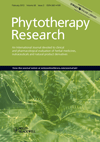Chronic Intraperitoneal and Oral Treatments with Hesperidin Induce Central Nervous System Effects in Mice
Abstract
Hesperidin (HN) is a flavanone glycoside abundantly found in citrus fruits. This flavonoid mediated central nervous system activity following intraperitoneal (i.p.) acute treatment. The responses of mice after the chronic i.p. (4 and 30 mg/kg/day) or the oral intake administration of this drug (20, 50 and 100 mg/kg/day) were studied by using the holeboard, the plus-maze and the locomotor activity tests. Hesperidin, chronically administered by the i.p. route, exerted a decrease in the locomotor and exploratory activities, thus evidencing a depressant activity. In turn, the chronic oral intake of this flavonoid induced anxiolytic-like effects. These varied responses could be attributed to the different routes of administration that could lead to the production of diverse active metabolites. Copyright © 2011 John Wiley & Sons, Ltd.




